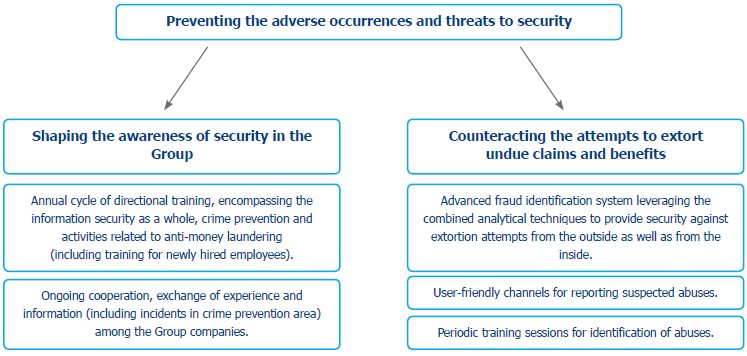Counteracting crime
Business






Insurance fraud is pathology whose costs are born by the insurance undertakings as well as their shareholders and the insureds themselves. According to the estimates of the Polish Insurance Association (PIU1) in 2016, the amount of fraud in Section I (life insurance) reached PLN 13.7 million. The share of insurance crime in total benefits paid out in Section I amounted to 0.075%. Due to specific nature of life insurance, especially the coexistence of protection products and savings products, fraudulent activities other than traditional extortion of benefits may cause even greater losses. These include, in particular, the following:
- appropriation of premiums,
- entering into an agreement for the purpose of extorting the benefit,
- entering into an agreement for the purpose of extorting the commission,
- crime involving documentation,
- other criminal activities (including, among others, money laundering).
1 P. Majewski, “Data analysis concerning the crimes disclosed in 2016 in relation to the operations of insurance undertakings – members of the Polish Insurance Association”, the Polish Insurance Association, Warsaw, 2017.
The scale of fraud on the Polish insurance market in 2016 was estimated at PLN 19.0 million. During that time, the employees of insurance undertakings of Section II (property and casualty insurance) recorded 9,515 criminal acts for total amount of PLN 211.9 million. According to PIU’s estimates, they accounted for 1.15% of the claims paid. Most frequently, extortions occurred in the following areas:
- motor TPL insurance (property insurance),
- motor TPL insurance (casualty insurance),
- and motor own damage (MOD) insurance.
Insurance crime outside of the claim payout area was estimated at PLN 17.9 million.
Standards concerning the activities associated with counteracting insurance crime are contemplated in several regulations and internal procedures. The document of key importance in PZU and PZU Życie is the Security policy. Some of the more detailed regulations and specific IT data analysis tools, which are described in the security policy, are confidential. If disclosed to the general public, they could increase the risk of criminal activities. The security policy is comprehensive and it covers a greater area than only insurance crime prevention. It regulates the following areas: information security, crime prevention, anti-money laundering (AML), physical security, operational continuity and IT security. The security policy defines the security principles, the employee rights and duties, as well as management activities.
Preventing money laundering and financing of terrorism - “Money laundering and terrorism financing are considered a real and material risk to our operations.
It is a global problem that has serious implications on the financial market. For this reason, our company takes any and all measures prescribed by law to prevent the occurrence of situations in which transactions involving PZU could be used as a tool for money laundering or financing of terrorism.”
An important element of the PZU’s security system includes shaping the awareness, including the awareness of the information protection obligation and crime prevention. Such an approach is the evidence for the organization’s maturity as well as its compliance with an obligation to ensure the security of its operations. PZU is placing a significant emphasis on increasing the employee awareness by seeking to mitigate the risk associated with the human factor. Therefore, the conducted activities are addressed at all the employees and are carried out on regular basis in order to solidify the provided contents.

As part of its crime prevention activities, Bank Pekao has implemented the Anti-Money Laundering and Terrorism Financing Prevention Policy. The document outlines the bank’s tasks and procedures to ensure compliance with an obligation to prevent the exploitation of the bank’s activities for purposes of committing the crime of money laundering or financing of terrorism, on the basis of domestic regulations and the regulations in effect in all the European Union (EU) member states. In addition, the policy introduces the Program for preventing money laundering and financing of terrorism. To supplement the foregoing activities, the bank also has in place the Financial Sanctions Policy which sets the standards of proceeding with respect to clients, payments and transactions, in order to prevent the bank from taking the actions which are in contravention with the domestic and international financial sanctions, in particular sanctions imposed by the European Union, The Office of Foreign Assets Control (OFAC) of the US Department of the Treasury and the United Nations (UN).
Other Pekao Group companies, which are conducting the operating activities (excluding Pekao Bank Hipoteczny and Pekao Investment Banking), have in place the crime-prevention policies and internal regulations that are adapted to the type of conducted activity.
Alior Bank has in place the Crime Prevention Policy which outlines the procedures for preventing the crimes from being committed to the detriment of the bank and its clients, and the unit responsible for that Policy is the Security Department. The provisions of the policy outline the basic principles for preventing the internal and external crime, crime detection, conducting explanatory proceedings, and carrying out prevention activities aiming at preventing such incidents from occurring in the future.
Other financial services companies also have in place the crime prevention policies. Money Makers TFI has implemented the anti-money laundering policy.
In order to promote online security, in 2017 Alior Bank assumed patronage over the Third European Cybersecurity Forum CYBERSEC. This is the conference which is dedicated to solutions supporting the conducting of effective and independent activities in the cyberspace. The bank’s experts participated in the panel “Innovation & cybersecurity – potential of the CEE region” and in the debate “Blank cheque for cybersecurity in the financial sector?”, and they presented model cybersecurity solutions in the banking sector. An important element of activities related to corporate social responsibility with regard to cybersecurity included also educational workshops for senior citizens.
